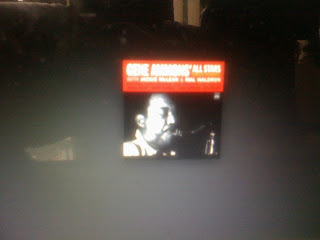BLACK SOCIAL HISTORY Gene Ammons, who had a huge and immediately recognizable tone on tenor, was a very flexible player who could play bebop with the best (always battling his friend Sonny Stitt to a tie) yet was an influence on the R&B world. Some of his ballad renditions became hits and, despite two unfortunate interruptions in his career, Ammons remained a popular attraction for 25 years.
Son of the great boogie-woogie pianist Albert Ammons, Gene Ammons (who was nicknamed "Jug") left Chicago at age 18 to work with King Kolax's band. He originally came to fame as a key soloist with Billy Eckstine's orchestra during 1944-1947, trading off with Dexter Gordon on the famous Eckstine record Blowing the Blues Away. Other than a notable stint with Woody Herman's Third Herd in 1949 and an attempt at co-leading a two tenor group in the early '50s with Sonny Stitt, Ammons worked as a single throughout his career, recording frequently (most notably for Prestige) in settings ranging from quartets and organ combos to all-star jam sessions. Drug problems kept him in prison during much of 1958-1960 and, due to a particularly stiff sentence, 1962-1969. When Ammons returned to the scene in 1969, he opened up his style a bit, including some of the emotional cries of the avant-garde while utilizing funky rhythm sections, but he was still able to battle Sonny Stitt on his own terms. Ironically the last song that he ever recorded (just a short time before he was diagnosed with terminal cancer) was "Goodbye."
Eugene "Jug" Ammons 14, 1925 – July 23, 1974 also known as "The Boss," was an American jazz tenor saxophonist, and the son of boogie-woogie pianist Albert Ammons.
Born in Chicago, Illinois, Ammons studied music with instructor Walter Dyett at DuSable High School. Ammons began to gain recognition while still at high school when in 1943, at the age of 18, he went on the road with trumpeter King Kolax's band. In 1944 he joined the band of Billy Eckstine (who bestowed on him the nickname "Jug" when straw hats ordered for the band did not fit), playing alongside Charlie Parker and later Dexter Gordon. Notable performances from this period include "Blowin' the Blues Away," featuring a saxophone duel between Ammons and Gordon. After 1947, when Eckstine became a solo performer, Ammons then led a group, including Miles Davis and Sonny Stitt, that performed at Chicago's Jumptown Club. In 1949 Ammons replaced Stan Getz as a member of Woody Herman's Second Herd, and then in 1950 formed a duet with Sonny Stitt.]
The 1950s were a prolific period for Ammons and produced some acclaimed recordings such as "The Happy Blues" (1955), featuring Freddie Redd and Lou Donaldson. Musicians who played in his groups, apart from Stitt, included Donald Byrd, Jackie McLean, John Coltrane, Kenny Burrell, Mal Waldron, Art Farmer, and Duke Jordan.
His later career was interrupted by two prison sentences for narcotics possession, the first from 1958 to 1960, the second from 1962 to 1969. He recorded as a leader for Mercury (1947-1949),Aristocrat (1948-1950), Chess (1950-1951), Prestige (1950-1952), Decca (1952), and United (1952-1953). For the rest of his career, he was affiliated with Prestige. After his release from prison in 1969, having served a seven-year sentence at Joliet penitentiary, he signed the largest contract ever offered at that time by Prestige's Bob Weinstock.
Ammons died in Chicago in 1974, at the age of 49, from cancer.
Style[edit]
Ammons and Von Freeman were the founders of the Chicago school of tenor saxophone. Ammons's style of playing showed influences from Lester Young as well as Ben Webster. These artists had helped develop the sound of the tenor saxophone to higher levels of expressiveness. Ammons, together with Dexter Gordon and Sonny Stitt, helped integrate their developments with the emerging "vernacular" of the bebop movement, and the chromaticism and rhythmic variety of Charlie Parker is evident in his playing.
While adept at the technical aspects of bebop, in particular its love of harmonic substitutions, Ammons more than Young, Webster or Parker, stayed in touch with the commercial blues and R&B of his day. For example, in 1950 the saxophonist's recording of "My Foolish Heart" made Billboard Magazine's black pop charts The soul jazz movement of the mid-1960s, often using the combination of tenor saxophone and Hammond B3 electric organ, counts him as a founder. With a thicker, warmer tone than Stitt or Gordon, Ammons could at will exploit a vast range of textures on the instrument, vocalizing it in ways that look forward to later artists like Stanley Turrentine, Houston Person, and even Archie Shepp. Ammons showed little interest, however, in the modal jazz of John Coltrane, Joe Henderson or Wayne Shorter that was emerging at the same time.
Some fine ballad performances in his oeuvre are testament to an exceptional sense of intonation and melodic symmetry, powerful lyrical expressiveness, and mastery both of the blues and the bebop vernacular that can now be described as, in its own way, "classical."
King Pleasure recorded his [vocalese] take on Ammons' composition "Hittin' the Jug" under the title "Swan Blues".
"Answer Me, My Love" written by Fred Rauch, Carl Sigman and Gerhard Winkler, performed by Gene Ammons, is featured on the soundtrack for Romance & Cigarettes (2005). He played on a Bb Conn 10M tenor saxophone with a Brilhart Ebolin mouthpiece.
Ammons is considered a major influence on the style of popular jazz tenor saxophonist Joshua Redman.
















































































No comments:
Post a Comment